Adapting “A Murder of Gods”
Wow, that was an episode. I’m just going to go ahead and say this piece on its adaptational decisions will be a little shorter only because this episode had nearly nothing from the novel. This was a great thing though; the complete originality of this episode showed us that the writers, working of course with Neil Gaiman, are perfectly able to write a great story while still catering both to the overall scheme of events playing out in contrast to the novels, and what the writers have in store when they change up the series. While I’ve been pretty outspoken on certain directions, the series has taken with placement of particular scenes and certain portrayals of some characters, this episode completely renewed my faith in what direction the series is taking.
Though the episode had no events that take place in the novel, it touched upon one very important trope that does exist there: what does it take to kill a God? Up until now, we’ve seen what the power belief can do for these Gods and Goddesses and how it gives them their own power. We also know that a lack of belief causes them to lose their power and eventually they’ll disappear, or at least that’s the idea. In the novel, after the House on the Rock, we learn that Gods can indeed die as it’s mentioned some that Wednesday knew had. While I’m still pretty nit-picky on how Shadow and Laura are being tossed about in terms of their personalities, the sheer excellence of the writing in this episode almost makes me wish that they were featured in the novels, including everything to do with Vulcan. But more of him later.
Coming to America
This one was probably my favorite of all the original vignettes, especially after Wednesday decided to mention the success of all the “Jesus” around the world. Not only does it give us a reprisal to the world building that the writers are evolve but we get another sub plot that sets its roots in real world issues. This is a particularly sensitive topic in today’s political climate, considering the conversations surrounding illegal immigration. While it hard to say whether the outcome of events are a completely accurate display of real world events, it surely isn’t shying away from the thoughts that are on some minds regarding the subject.
In this vignette, we follow several Mexican men, women, and children attempting to cross the Rio Grande in attempts to sneak into the United States under cover of night. Because of the varying age groups among the group, the crossing might prove troublesome for those who can’t swim, but they’re all pretty resourceful. As most of the group makes it across one man is nearly left behind until he’s saved by Jesus, in the likeness of a Central American, clearly this is who Wednesday meant as the “Mexican Jesus”.
Things take a turn for the worst when the border patrol arrives and opens fire on the group, killing nearly all of them with rounds that clearly have “Vulcan” printed across them. By the end of the scene, Jesus saves one from being shot, and takes shots to his palms and chest that slowly transitions into him with the iconic heart symbol and the crown of thorns.
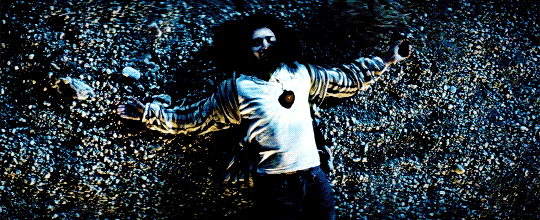
With this we can clearly see that the theme of this episode would be death, particularly the death of Gods. Not only this but of course what can be considered as belief to a God. The Vulcan written across the bullets obviously points to the God himself. By the time it’s over, we definitely have it our minds what is to come in this episode and maybe towards the final two episodes of the season. With how they’re still changing the timing of certain scenes, between this and Zoyra’s prediction earlier in the series, we may just get Wednesday’s death earlier than we though. Yet, hopefully not before the House on the Rock scene, which doesn’t look like it’s going to be in this season.
The Fires of War
The main bulk of the episode follows Shadow and Wednesday after they escaped the police station where they were finally confronted with the elusive Mr. World. Upon their escape, Shadow begins to notice that a wound he had sustained earlier has suddenly begun to bleed and show signs of infection. Seeing the danger this poses, Wednesday pulls over to do what he can. What he does begins to prove to Shadow that he indeed isn’t what he seems. Of course watchers who have never read the novels still have no idea who this man is, but along this entire episode, the writers begin to drop hints that begin to obviously place him in the shoes of Odin, the All-Father of Norse mythology. This scene is a first real concrete segment as to that, considering the tree is an obvious metaphor for the Norse tree of the world, Yggdrasil.
After this part, we are shown a town located in Virginia where once again we are encountered with the company known as Vulcan. The town itself thrives under its industry and after a scene in which a factory manager has a horrible smelting accident the town is marching almost in the style of Nazi Germans with red armlets displaying the Vulcan logo and clamoring to the sounds of gunfire. Clearly the Roman god holds his own dominion over this town, yet how is the much more interesting bit.
For those not familiar Vulcan, he is the Roman God of Volcanoes and fire association. He is not so different from his Greek counterpart, Hephaestus who was the Blacksmith of the Gods as both of them are known to allegorically symbolize metal work and weapon and armor making.
This is where the great originality in the series’ writing comes into effect. As Wednesday greets this God like an old friend, he explains how this town is basically his. Firstly, that man who met a fiery fate was indeed a sacrifice to his God. The industry is a mirror of what Vulcan does, make weapons, making things from metal. As they are distributed and used, each bullet fired is like a prayer to Vulcan and gives him the strength he needs to influence the entire town to his worship.
In short, the God is living like a King, not so different in the way that Mr. World explained the missiles for Odin in the previous episode.
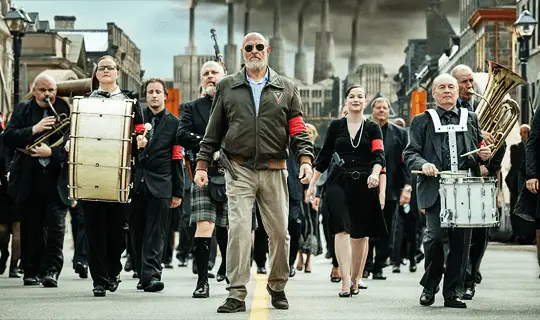
I really liked how they’re making this work. It kind of went unexplained in the second episode of the series about how so many Gods can still exist with little to no followers. The Zorya’s of course had their fortune telling—either of the three of them being able to conjure up divination yet was entirely based on whether they were lying or not. Czernobogs was a little harder to understand, but he made it work. Yet, Vulcan, this was a bigger power altogether and if you really consider it, the death of Mexican Jesus was completely under his own influence, more so when you take into consideration his actions towards the end of the episode.
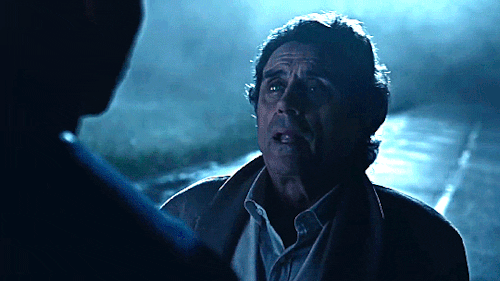
As the episode progresses, we get Vulcan throwing some weird shade at Shadow. At first it seems slightly racist, like the part with the hanging tree. Now it could be taken as racist considering that Shadow was lynched in the series premiere and the fact that the town has a very Nazi-Germany feel to it. What Vulcan says in the end however just gives more of a point towards Norse mythology. Again for those learned in Norse tales, Odin hung himself from Yggdrasil and was pierced in the side in sacrifice to attain great knowledge. This is obviously the show writers trying to tease the mystery of not only Wednesday’s identity but as well as Shadows considering it’s always directed towards him.
After this uncomfortable scene Wednesday asks Vulcan to forge a mighty sword that can kill a God, which we already saw that Vulcan can do. But that also brings us to the philosophical question. What makes a God? Mr. World and Media, are they simply Gods because they are worshiped so grandly or did they begin their existence as Gods. Of course, novel readers will know why Mr. World is a God but that’s not something i’ll utter here, not yet. By the end of the episode Wednesday realizes that Vulcan is playing him false and is in the employ of Mr. World. Whether the sword he made was a sham or not, the power behind Odin succeeded in removing Vulcan’s head from his body, another God bites the dust.
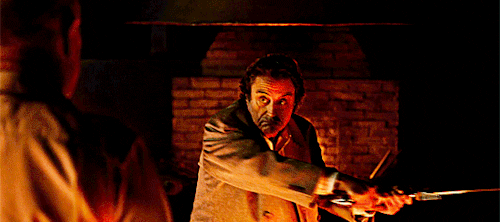
The Fellowship of Assholes
Who ever wrote this segment was genius. On their way back to the motel where Shadow is no longer in, Laura and Mad Sweeney are no stuck with one another as they try to travel cross country in order to protect Shadow. Sweeney not want more than his coin back is willing to tag along in order to be there when she finally has no need of it. These two hate each other so much that all they do is throw insults at one another. What I loved was when they attempted to steal a cab only to find out it belonged to Salim, the Muslim man who was with the Djinn earlier in the season. It’s nice to see some continuity with otherwise background character give greater roles, though of course many people are probably still wonder where Bilquis and the Djinn himself went to. No doubt they’re on their way to Wisconsin.
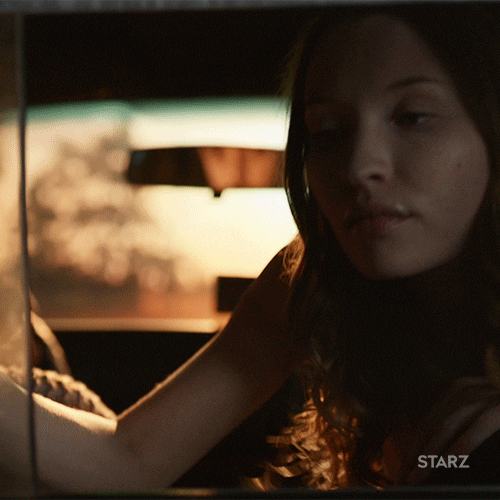
As the three also travel towards that end, we get the only scene in this episode that has anything to do with the books. This is when Laura convince Salim to return to Eagle Point to see her family. It’s just as cold and sad as in the novel when Laura discovers that they are living life without her. It has only been the space of a few days since she has died so one would expect mourning still, but alas life does have to go on.
It doesn’t seem that Laura will follow her own path as she did in the books, trying to lead a life again even though she is technically undead. Sweeney makes a point that was also not really made in the books but actually makes a ton of sense. Because she was freshly buried her body hasn’t reached a state of decomposition yet, but eventually her body will begin to rot, something we never really thought about happening to her the novel because it was never mentioned.
Final Thoughts
The lore of the novel is changing and not subtly anymore. Yet, if this episode proved anything to me is that it is in good hands. While the liberties taken have reached near Game of Thrones levels, this is an example of what good writing looks like. You can tell they’re taking every detail from the novels into account and not altering or omitting scenes, events, and personalities without reasons. In simpler terms, they don’t have Stannis burning Shireen simply to make him look like a villain.
The originality of the writing has evolved the story to address its pacing problem, which judging by the last three episodes looks to be finally taken into consideration. While I’ll of course mourn the changing of certain character, I cannot deny that their transformation isn’t the worst that could happen to them. I trust the writers and I trust Gaiman to give a creative evolution of this great tale into something both book readers and show-only’s will enjoy and appreciate.

